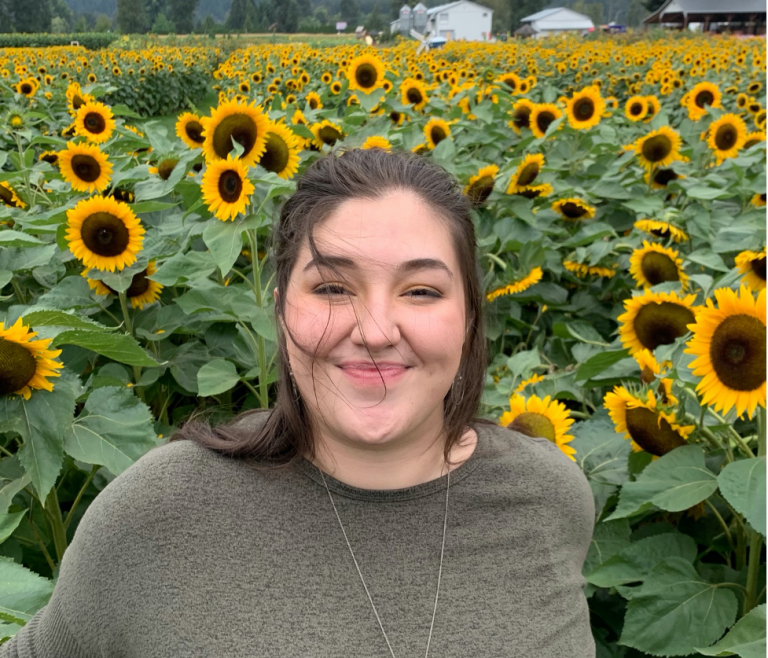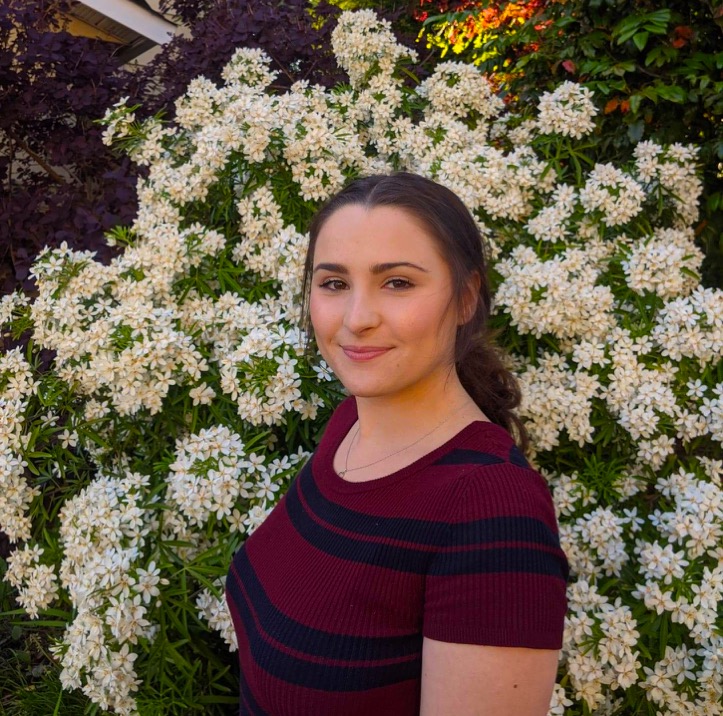The department of Biochemistry & Molecular Biology is thrilled to announce the 2022 Astell Award Winners; Morgan Towriss and Catalina Ionescu! Congratulations!
The Astell Award is to recognize trainees at all levels in Biochemistry and Molecular Biology at UBC for outstanding commitment to activities related to promoting Equity, Diversity, and Inclusion (EDI).

Morgan Towriss, Graduate Student
Morgan is a proud Ts’msyen <jim-shee-aan> woman, scientist, and EDI advocate. As an indigenous woman in science, Morgan overcame many barriers to being an academic and is now a passionate advocate for increasing inclusivity for indigenous students in STEM. She loves talking to and working with younger indigenous students through tutoring and mentorship to help them navigate the barriers of academia while combining indigeneity and traditional cultural beliefs with scientific beliefs and research. Morgan regularly volunteers with indigenous organizations to promote cultural-focused healing and recovery from addiction, trauma, and mental health problems.
Additionally, Morgan is a passionate advocate for mental health and disability inclusivity. She is very open about her struggles with bipolar disorder and often openly discusses her mental illness to reduce stigma. Morgan experienced many challenges navigating university with mental illness; as a result, she is now passionate about promoting inclusivity and providing mental health support at UBC.
As a member of the BMB EDI committee, she regularly discusses mental health challenges and how to incorporate more inclusive practices at the university. Morgan helped start a mentorship program aimed at matching mentors and mentees based on similar backgrounds and barriers. She advocates for open conversation about mental health on all levels – including presenting to high school and younger university students about her mental health challenges and what supports are available for people struggling during their time in university.
Morgan has also worked on a project in collaboration with the Canadian Mental Health Association and Vancouver Coastal Health to study the implementation of novel mental health resources in Vancouver. In this project, Morgan focused on active coproduction and including the voices of those that are benefited by the research in the process of research.
She hopes to continue advocating for inclusivity and using coproduction practices in her research to promote and improve the active inclusion of everyone in science and academia.

Catalina Ionescu, Undergraduate Student
Catalina has made it a priority to guarantee all her activities promote equity, diversity, and inclusion as empowerment and being supportive of everyone is not something that was emphasized in her country of birth, Romania. She is proud to be an ally of underrepresented groups and pleased to offer equitable and inclusive opportunities in a wide range of clubs she has been involved in.
Catalina’s work through the UBC First Aid Student Team promoted education on various health related topics including panic attacks, mental health resources, Naloxone use, and AED use. Through making posters on these topics which were showcased in booths and workshops, the main goal of knowledge translation was achieved and resulted in a more inclusive environment for all by making this knowledge easily accessible.
Catalina’s work through the Biochemistry Student Association permitted biochemistry students equal representation in the STEM field and an inclusive environment for students to partake in. She achieved this through inclusive hiring practices by taking a more holistic approach where no previous experience is required. Additionally, through being the Health and Wellness Coordinator for two years, she ensured inclusively and accessibility in BSA events by making all events free of charge as well as picking commuter friendly hours since a large majority of biochemistry students are commuters.
Catalina’s work with Free Periods Canada allowed for menstrual equity advocation for people who menstruate. Her work entailed making social media posts educating users on menstruation and various uterine health problem with two main goals in mind: de-stigmatization of this topic and knowledge translation. By acting on these goals, it allows for increased accessibility to this topic and inclusion.
Catalina’s work with UBC Peer Health Educators offered educational events and social media posts on sexual health and sexuality offering students safe spaces to help in normalizing these topics. By creating various social media posts and posters with a goal of knowledge transition, it allowed for an inclusive space accessible to folks to further this discussion. Additionally, through helping in the Safer Sex Shop at the Wellness Center, it allows for a safe space for people to explore.
Lastly, through working collaboratively with Biochemistry and Molecular Biology professors to hire a self-identifying women professor, she helped increase the diversity within our Biochemistry community!
The Astell Award was name after Dr. Caroline Astell one of the first women faculty in Biochemistry and Molecular Biology at UBC. Dr. Astell completed her undergraduate degree in Math/Zoology, Masters in Genetics and PhD in Biochemistry/Nucleic Acids all at UBC. After completing a postdoctoral fellowship at Rockefeller University in the USA, she worked at the University of Toronto as a Research Associate and then as an Assistant Professor at the University of Calgary.
She then returned to UBC as a Research Associate and advanced through the ranks to Assistant, Associate and full Professor in Biochemistry and Molecular Biology. Dr. Astell’s research focused on understating the molecular biology of animal viruses and the structure and replication of eukaryotic chromosomes. She had both an impressive funding and publication track record, leading to over 62 published papers, numerous book chapters and patents and a co-authored book on Nobel Laureate Michael Smith. Dr. Astell was also a dedicated member of the department, leading many committees and the BC Genome Sciences Center. She was also an avid instructor in Biochemistry and directly mentored 11 graduate students and served on over 40 student supervisory committees during her career. Dr. Astell retired from UBC in 2004 and continues to serve her local community through volunteer and outreach activities.